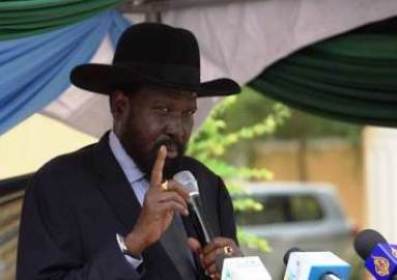Opposition parties’ alliance accuses S. Sudan’s Kiir of violating constitution over 28 states
October 5, 2015 (JUBA) – The national alliance of major South Sudanese political parties have accused president Salva Kiir of violating the country’s constitution by unilaterally creating 28 new states, questioning constitutional and legal basis for issuing the order.

“This was not because my government and I were not interested in devolving such powers to you, including finances of the country, but my administration in the center was busy with issues connected to your right for self-determination, such that you become free and sovereign state,” said Kiir, who was flanked by information minister and other key ministers in his administration as he read out the order.
“Now indeed you are free and sovereign state. Therefore, there is no reason for me to retain your constitutional right for self-governance, self-reliance, self-development and determining your future through free, fair, and transparent and democratic elections in three years to come,” he added.
The head of state further added in his concluding statement as he was leaving the podium on which he read out the order: “Now you have the opportunity to develop your locality, home villages, through the mobilization of your local and state resources… There is no any other better time to do this than now.”
His order has however sparked debate and objection between proponents and opponents, with some of his critics describing it as illegal and unwarranted while his supporters hailed it as a bold decision.
Speaking during an exclusive interview with Sudan Tribune on Monday, Martin Aligo Abe, Secretary General of the national alliance of political parties said he was surprised by the unilateral decision of the president which created and divided the country into “tribal and clan type” states without complete regard to legal and constitutional basis.
“I was not watching news broadcast by South Sudan Television and I did not accept when I was told about it because as far as separation of powers is concerned, the president has no power to create states or counties. It is work of the council of states. The creation of states is the competence of the parliament. There is no article in the constitution which gives the president such powers,” said Abe.
Lam Akol, the leader of the alliance of major political parties in the country pointed out that Article 101(f) talks only about constitutional amendments initiated by the president and does not give the president a power to create more administrative units.
“It was a provisional order which the President said was effective as of 2nd October. The Constitution also stipulates that it is the Council of States that initiates legislation on decentralization (Article 59(a)),” he said.
He explained that provisional orders cannot be issued on matters affecting the Bill of Rights, the decentralised system and cannot be issued when the National Legislature is in session (Article 86(1)).
“Article 162 stipulates that the number of states is ten and that state boundaries, their names, their capitals, may be changed except by two-thirds majority in the Council of States,” he further explained.
The top opposition leader said the president’s unilateral order was a clear violation of the transitional constitution of South Sudan, 2011.
(ST)
